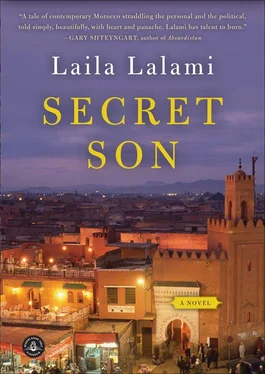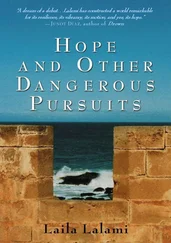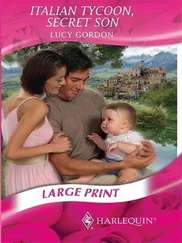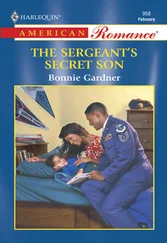He did not slow down until he got to a commercial street, several blocks down. He went into a bookstore. There was nowhere to sit, so he stood in front of the dictionary section. From his book bag he took out the rag he normally used to clean dust from his shoes and used it to wipe the sweat from his face. He straightened his shirt. He pulled up his pants. Now, finally, he allowed himself to take a deep breath — he nearly doubled over from the sharp pain. Something was broken. But of course he could not go to the hospital. What if the police were there, waiting to see who turned up? Besides, there was the matter of his mother. If she ever found out what he had done, he would never hear the end of it. “Keep your head down, and mind your own business,” she told him, frequently and dogmatically. There was only one place for him to go.

They sat in the empty café, at a table on which the waiter, a rotund man with puffy eyes, had laid several stacks of msemmen and harsha, bowls of nuts, and pots of coffee and mint tea. Youssef contemplated the food without being able to summon any appetite. Moussa, in his white lab coat, sat next to him, balancing his chair on its hind legs, resting its back on the wall behind him. Hatim was across from Youssef, smoking a cigarette. Maati, too, had left his guard post to be with them. He picked up a piece of harsha and ate it in a few quick bites, leaving a trail of semolina crumbs on his blue shirt. He was growing a beard, but his facial hair wasn’t cooperating. It grew here and there in tufts that curled in on themselves and stubbornly refused to connect.
“Drink, my son,” Hatim said, pushing a tall glass of water toward Youssef.
Youssef reached for the glass, but the pain in his chest made him wince.
“You have to rest for a few days,” Moussa said. He had examined Youssef in the infirmary, bandaged him, and told him he was lucky to have broken his eighth and ninth ribs. Had he been hit lower or higher, he would have risked a damaged organ, and then who knew what would have happened? “We thank God, in any case,” Moussa added.
“You’re safe now,” Hatim said, smiling in a way that made Youssef uncomfortable. “And you will get better, insha’llah.”
Youssef did not care if it hurt — he was simply relieved that he did not have to deal with the police or with his mother.
“How many students were there?” Hatim asked.
“About two hundred.”
“And how many were taken into the police trucks?”
“I don’t know. Ten or fifteen, maybe. I ran away, so I don’t know how many others were arrested.”
“Was there much blood?” Hatim asked.
What a strange question, Youssef thought, though he was willing to answer it for the sake of the article. The piece was Hatim’s idea; it would be an eyewitness account of police brutality on student campuses, and it would run in the Party’s newspaper, At Tariq Al Mustaqim . Youssef closed his eyes now and thought about those few minutes when the police charged. The memory had been preserved in jump cuts, and he played and replayed them in his head, hoping to see if he had missed any details. At length, he shook his head. “I don’t know.”
“There had to be,” Hatim said. “They used their batons. In any case, we have the photos of you.” Those, too, had been his idea. When Youssef had taken his shirt off in the infirmary, Hatim had immediately gone upstairs to his office and come back with a digital camera. “No!” Youssef cried, but Hatim waved his concerns away. “Don’t worry, my son. I’ll only take a picture of you from the neck down. No one will know it’s you.”
“Will you write the article yourself?” Youssef asked.
“No. I will leave that to the professionals at At Tariq . But they will tell your story, my son. You can be sure of that.”
Amin came in. There had been a strike at the law faculty, too, but when Hatim asked him about it, Amin said he hadn’t seen anything. “Well,” Hatim said, taking his mobile phone out of his pocket. “I’ll get to work with what we do have.” He walked away, holding Moussa by the elbow and whispering to him.
Amin turned to Youssef. “Yak labas?” he asked.
“I’m fine,” Youssef said.
Amin poured himself a glass of mint tea and blew on it to cool it off. “What were you thinking?”
“What do you mean?”
Maati and Amin glanced at each other. It was Maati who spoke. “Why did you get involved in the protest, my brother?”
“You’re just going to bring trouble on yourself,” Amin added.
Youssef shrugged. “They’re my classmates. I had to do something.”
“And what good did it do?” Amin asked.
Youssef did not reply. Behind the counter, the waiter turned up the volume on the radio in order to listen to an advertisement for lower prices on refrigerators and new ways to finance them. The TV mounted on the wall was set to a foreign satellite channel, and it broadcast a popular call-in show where a hijabed woman read people’s fortunes in cards. Outside, children were playing tag, and in the distance a car screeched to a halt. Youssef did not want to think any longer about what had happened or what could have happened. The part of angry student activist wasn’t for him; this much he now knew.
“And you?” Maati asked, looking at Amin. “Where were you, if you weren’t in the strike?”
“With Soraya,” Amin said with a wide smile. “Ah, that girl. Mmm-mmm.” He moved his fingers in a circular motion, as if he were squeezing lemons.
Maati shook his head. “You’d better stop messing with her. I’m telling you, someday her brother will come find you.”
“Stop? Are you kidding me?” Amin turned to look at Youssef as if to say, Can you believe this?
“She’ll go all the way?” Youssef asked. He had never thought that Amin could get a girl like Soraya — or any girl at all.
“We’re supposed to meet tonight.” Amin winked.
“For real?” Youssef asked.
“Why would I lie about something like that?”
“Haraam,” Maati said, shaking his head.
Amin leaned forward on the table. “What? What’s going on?”
“Nothing. I’m just saying. It’s not right.”
“Since when is it not right? I never heard you complain when my brother took us to see that whore.”
“It’s not the same.”
“Is that what your boss says?”
Maati tilted his head sideways. “But Soraya—”
“What about her?” Youssef asked.
“I just didn’t think she was that easy.”
“She’s not easy, but she’s not Rabia Al Adawiyya, either. She likes me. Here,” Amin said, pushing the teapot toward Maati. “Go get a refill. Or do you have to ask permission from your boss for that, too?”
An unaccountable feeling of loneliness descended upon Youssef. He was used to such moments, but the events of the morning, his inability to share them with his mother, the pain in his chest — these made him more vulnerable today. The burden of his secret suddenly seemed to him far too heavy to bear. He glanced at Amin. If anyone could understand, it would be Amin, who was always angry with his father for spending his wages on drinking and gambling, and leaving the task of supporting the household to Amin’s mother.
“Can you keep a secret?” Youssef asked.
“Of course,” Amin said. “What is it?”
“My father’s not dead.”
Amin’s mouth dropped open. The shocked expression on his face frightened Youssef. What imprudence, what foolishness, had overtaken him! What could he tell Amin, in the end? That his mother had had a child out of wedlock? He could not bear the shame of her actions, let alone the shame of describing them in words, out loud. And what would Amin think of him — the bastard child? No, this would not do. He had to play with the truth, create a version with which both he and Amin could live.
Читать дальше













